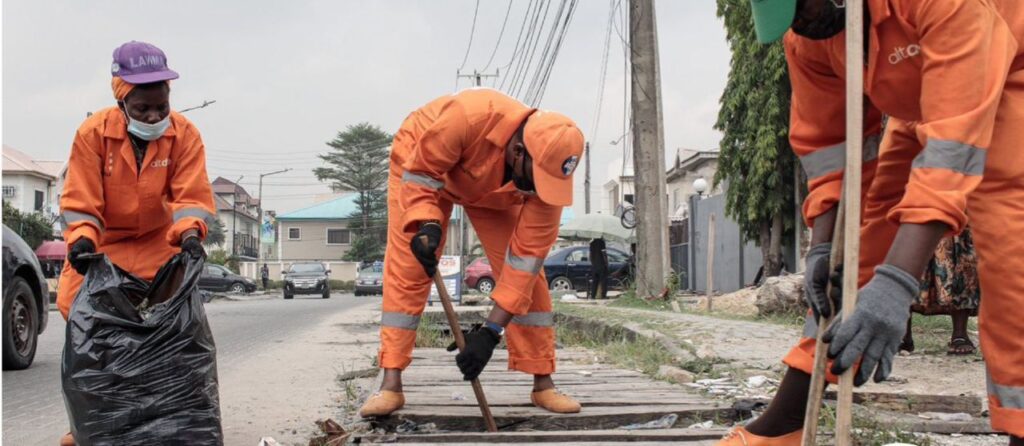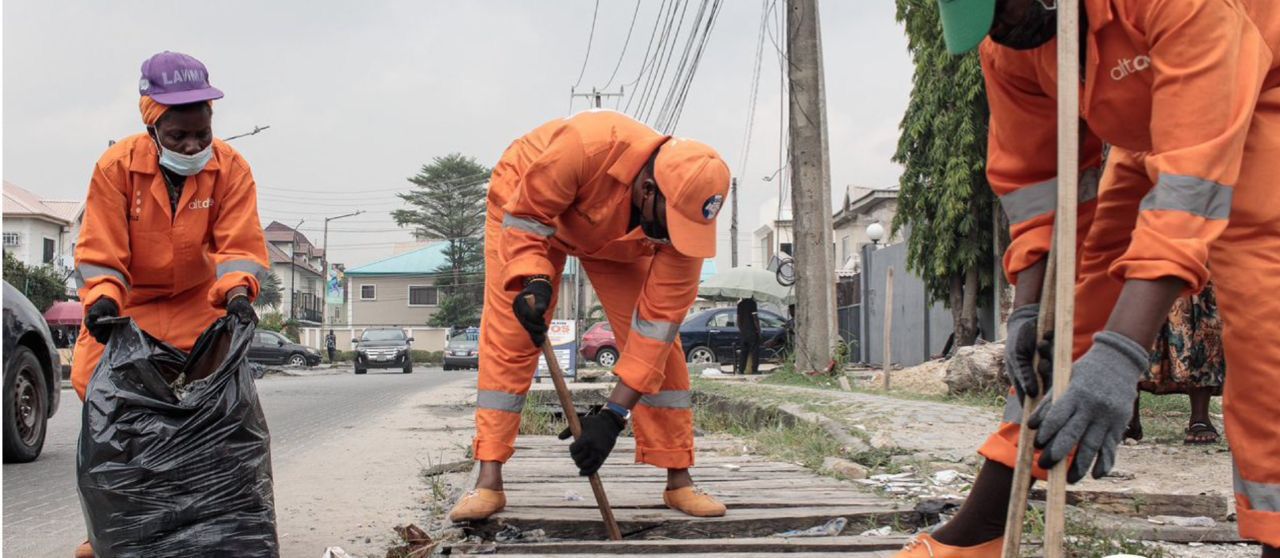The Lagos State Waste Management Authority (LAWMA) and allied agencies under the Lagos State Ministry of Environment and Water Resources demonstrated a robust commitment to enforcement, clamping down on infractions with unprecedented vigor. His expertise ensures that arrests lead to swift prosecutions, deterring repeat offenders and fostering a culture of compliance.
In this piece, I will attempt to cut through the noise and examine recent enforcements, highlighting their timeliness and impact. In a city where rapid urbanization exacerbates environmental woes, Wahab’s approach grounded in legal precision marks a pivotal shift.

Rather than mere rhetoric, his tenure emphasizes accountability, turning environmental laws into tangible tools for change. While challenges persist, these actions signal hope for a cleaner Lagos, provided the momentum continues.
LAWMA’s Frontline Assault on Waste Infractions
LAWMA, the primary agency tasked with waste collection, enforcement, and circular economy initiatives, led the charge in August 2025 with operations that targeted illegal dumping, open burning, and other violations. On August 19, 2025, LAWMA’s Enforcement Team apprehended two men Dominic Uja, 25, from Benue, and Barry Macaulay, 52, from Côte d’Ivoire for burning refuse from Grace Garden Event Place at Bisola Durosinmi-Etti Drive, Lekki. The offenders were handed over to the Lagos State Environmental Sanitation Corps (LAGESCOfficial) at Oshodi HQ for prosecution, and the event place was sealed indefinitely. This incident underscores the dangers of open burning, which releases toxic fumes and contributes to air pollution a pressing issue in densely populated areas like Lekki.
Wahab’s legal acumen shines here: by ensuring immediate transfer for prosecution under Lagos environmental laws, he closes the loop on enforcement, preventing cases from languishing. As a lawyer, Wahab understands the evidentiary requirements for successful convictions, likely streamlining processes to include detailed documentation and witness statements. This not only punishes violators but also sends a ripple effect through communities, encouraging responsible waste disposal.
Earlier in the month, on August 9, 2025, LAWMA conducted a 15-hour enforcement operation in Alimosho, focusing on persistent waste blackspots in the Ipaja Gate and Egbeda axis. From 6:00 PM on August 1 to 9:00 AM on August 2, the Waste Infractions Surveillance & Enforcement Team arrested three offenders: Bashiru Yakubu (27), Toye Olamilekan (28), and Ibrahim Sala (28). These individuals, including a notorious illegal waste collector, were prosecuted for dumping large volumes on road medians. Such operations reveal the entrenched problem of cart pushers and informal collectors who exacerbate flooding by clogging drains with refuse.
On August 16, 2025, LAWMA teams were on the ground in Apapa, clearing waste and restoring order in an area notorious for industrial litter. This proactive cleanup, while not an arrest-focused enforcement, complements the agency’s zero-tolerance stance. Apapa’s ports generate massive waste volumes, and LAWMA’s intervention prevents health hazards like cholera outbreaks. Wahab’s oversight ensures these efforts tie into broader ministry goals, such as transitioning to waste-to-energy solutions, which he has championed through partnerships.
Another notable action occurred on August 9, 2025, during a joint night operation with the Ministry’s Special Environmental Squad. Two individuals Godwin Edet (48) for open defecation at Itedo Estate, Lekki Phase 1, and Richard Ahmed (24) for indiscriminate dumping at Freedom Way junction were arrested and transferred for prosecution. Open defecation, a violation under the Lagos State Environmental Management and Protection Law, poses severe sanitation risks. Wahab’s legal-driven strategy ensures these cases are treated as criminal offenses, not mere nuisances, potentially leading to fines or imprisonment.
LAWMA’s August efforts also included anti-cart pusher operations around August 8, 2025, apprehending several individuals linked to illegal dumping. Cart pushers, often informal operators, undermine licensed Private Sector Participants (PSPs) by offering cheap but unregulated services. By ramping up surveillance, LAWMA disrupts this shadow economy, aligning with Wahab’s vision of a regulated waste sector.
Overall, LAWMA’s enforcements in August 2025 reflect a legalistic rigor attributable to Wahab. His background ensures that enforcement isn’t arbitrary but grounded in law, with prosecutions emphasizing deterrence. However, to sustain impact, investments in more PSPs and smart bins are crucial areas where Wahab’s advocacy could yield dividends.
LASEPA’s Crackdown on Noise and Air Pollution
The Lagos State Environmental Protection Agency (LASEPA), another key arm under the Ministry, focused on noise and air pollution in August 2025, sealing numerous establishments for violations. On August 19, 2025, LASEPA sealed a telecom mast at No. 18, Akanbi Arimi Street, off Adetola Street, Aguda, Surulere, after reports of air pollution from a faulty generator emitting toxic fumes and improper waste oil disposal contaminating soil. Despite multiple warnings, the facility ignored abatement notices, prompting closure. This action protects residents from health risks like respiratory issues, demonstrating LASEPA’s commitment to public safety.
Wahab’s influence is evident: as commissioner, he directs such operations, leveraging his legal expertise to ensure seals lead to prosecutions. His approach balances enforcement with dialogue, as seen in prior stakeholder meetings, but August’s actions show zero tolerance for non-compliance.
On August 15, 2025, LASEPA sealed a boutique shop along Iwaya Road, Onike, Yaba, for persistent noise pollution after unresolved complaints. Noise, often overlooked, affects sleep and mental health. By sealing the shop, LASEPA enforces permissible limits, urging soundproofing investments.
The previous day, August 14, 2025, saw a sweeping operation sealing over a dozen establishments, including lounges, hotels, churches, and commercial entities across Surulere, Mushin, and other areas. Notable seals included MDP 340 Onitire (Coca-Cola) in Ijeshatedo, Church of Calvary Ipinle Otito in Surulere, and Scott’s Industries Limited in Mushin all for noise exceeding limits. This multi-site crackdown highlights LASEPA’s data-driven approach, using noise monitoring to target hotspots.
While LAWMA and LASEPA dominated headlines, the Lagos State Wastewater Management Office (LSWMO) contributed on August 15, 2025, sealing six public toilet facilities in Idi Araba for non-compliance, likely related to sanitation standards. This action prevents waterborne diseases, aligning with the ministry’s water resources mandate.
The ministry’s Environmental Taskforce, under Wahab’s purview, conducted a major cleanup on August 20, 2025, in Agidigbi and Ikeja GRA, arresting 32 suspects (25 males, 7 females) for drug possession and other infractions during a raid from 1:30 AM. Areas like Alausa CBD and African Shrine frontage were cleared, restoring sanity.
.
Wahab’s Legal Backbone: Driving Prosecution and Systemic Change
Tokunbo Wahab’s legal background is the linchpin. As a visionary practitioner, he brings a focus on due process, ensuring that enforcement measures withstand judicial scrutiny. In August 2025, this manifested in consistent prosecutions, from waste burners to noise violators. His strategy avoids politicization, emphasizing collective responsibility.
Critics might argue enforcements are reactive, but Wahab’s partnerships for waste-to-energy these efforts could reduce landfill pressure, a step toward zero-waste.
The agency’s drive under Wahab’s leadership exemplifies a legal-driven renaissance in Lagos’s environmental governance. With over 50 arrests and numerous seals, the month proves enforcement’s efficacy. Yet, sustainability demands public buy-in and infrastructure boosts. Wahab’s tenure, if sustained, could make Lagos a model African city, clean, resilient, and just.
